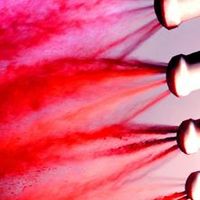Difference between revisions of "Coatings"
(Created page with "Category:Corrosion{{Knoppen}} <noinclude><!------------------------------------------------ * READ THIS FIRST * Only edit this page if you can improve the content. * Imprope...") |
m |
||
| (3 intermediate revisions by 2 users not shown) | |||
| Line 1: | Line 1: | ||
[[Category:Corrosion]]{{Knoppen}} | [[Category:Corrosion]]{{Knoppen}} | ||
[[Image:Powder_pink_spray.jpg|thumb|200px|Powder for pink spray]] | |||
'''Coating''' is a covering that is applied to the surface of an object, usually referred to as the '''substrate'''. In many cases coatings are applied to improve surface properties of the substrate, such as appearance, adhesion, wetability, corrosion resistance, wear resistance, and scratch resistance. In other cases, in particular in printing processes and semiconductor device fabrication (where the substrate is a wafer), the coating forms an essential part of the finished product. | |||
''Coating and printing processes'' involve the application of a thin film of functional material to a substrate, such as paper, fabric, film, foil or sheet stock. This article discusses what is frequently termed 'roll-to-roll' or 'web-based' coating. A roll of substrate, when wound through the coating machine, is typically called a '''web'''. | |||
Coatings may be applied as liquids, gases or solids. Coatings can be measured and tested for proper opacity and film thickness by using a drawdown card. | |||
Latest revision as of 01:23, 11 August 2014
Coating is a covering that is applied to the surface of an object, usually referred to as the substrate. In many cases coatings are applied to improve surface properties of the substrate, such as appearance, adhesion, wetability, corrosion resistance, wear resistance, and scratch resistance. In other cases, in particular in printing processes and semiconductor device fabrication (where the substrate is a wafer), the coating forms an essential part of the finished product.
Coating and printing processes involve the application of a thin film of functional material to a substrate, such as paper, fabric, film, foil or sheet stock. This article discusses what is frequently termed 'roll-to-roll' or 'web-based' coating. A roll of substrate, when wound through the coating machine, is typically called a web.
Coatings may be applied as liquids, gases or solids. Coatings can be measured and tested for proper opacity and film thickness by using a drawdown card.
